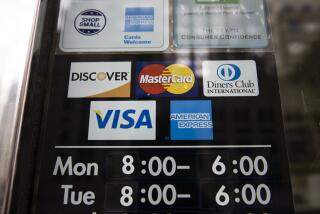PERSPECTIVE ON CONSUMER SPENDING : Digging Out From Debt : Americans could use a presidential nudge--and some tax incentives--to put less on credit and more in the bank.
To get the whole country behind his efforts to rebuild the economy, the President-elect has to make consumers part of his team. The place to start is at the top: The Clinton economics summit needs some down-to-earth consumer experts to mesh the wielding of the levers of government and industry with the attitudes and behaviors of the public.
In all the talk about economic rebuilding, jobs and infrastructure loom large, yet little has been said about the role of the average American consumer, which will be vital. For example, job-creating requires capital. Consumers have to be encouraged to save--and not to panic when curtailed spending brings a temporary downturn in the economy.
The American public may be ready to stop spending more than they earn. Many people are strapped by consumer credit debt (now at $722 billion, excluding mortgage and credit-card debt). And, with interest rates on consumer credit continuing to float well above other interest, Americans are primed to tighten their credit belts.
There is a short-term downside to less buying on credit: The affected industries would have to be massaged. But the long-term effect of consumers with money in the bank would be their having a cushion so they wouldnât have to stop spending altogether if--when--times get tougher.
Trouble is, after the big-spending â80s, many people donât know how to manage their money--how to budget, how to spend wisely, how to save. Middle-class Americans tend to get into spending trouble around clothes, cars, vacations and entertainment. They may need some âfireside chatsâ from the President to encourage thrift, to create a climate where saying âI canât afford itâ is patriotic.
The President will also have to work the legislative side of consumer persuasion. Tax disincentives to saving--in general, interest is taxed as it is earned--must give way to tax incentives. An exemption from income tax on savings accounts up to a certain level (say, $20,000 to $30,000) would help re-liquefy banks and give small savers access to tax-free income, an advantage that is now available only to wealthier buyers of tax-exempt bonds.
Other ideas that Americans might buy if they are sold on economic recovery as teamwork:
* A requirement that people who have more than $10,000 in savings accounts pay for their own deposit insurance, thus lowering Treasury exposure.
* A deficit tax, levied like a sales tax, to be applied directly to the deficit.
* A tax deduction for contributions to a âdeficit foundation.â
It would take a gift of about $16,000 from every American to pay off the deficit today. Doing that would be the biggest investment we could make in the countryâs economic future. But right now, consumers need help in taking the first steps of saving instead of spending their own money. Maybe they would listen to the first President weâve had in quite a while who remembers his middle-class roots.
More to Read
Inside the business of entertainment
The Wide Shot brings you news, analysis and insights on everything from streaming wars to production â and what it all means for the future.
You may occasionally receive promotional content from the Los Angeles Times.










